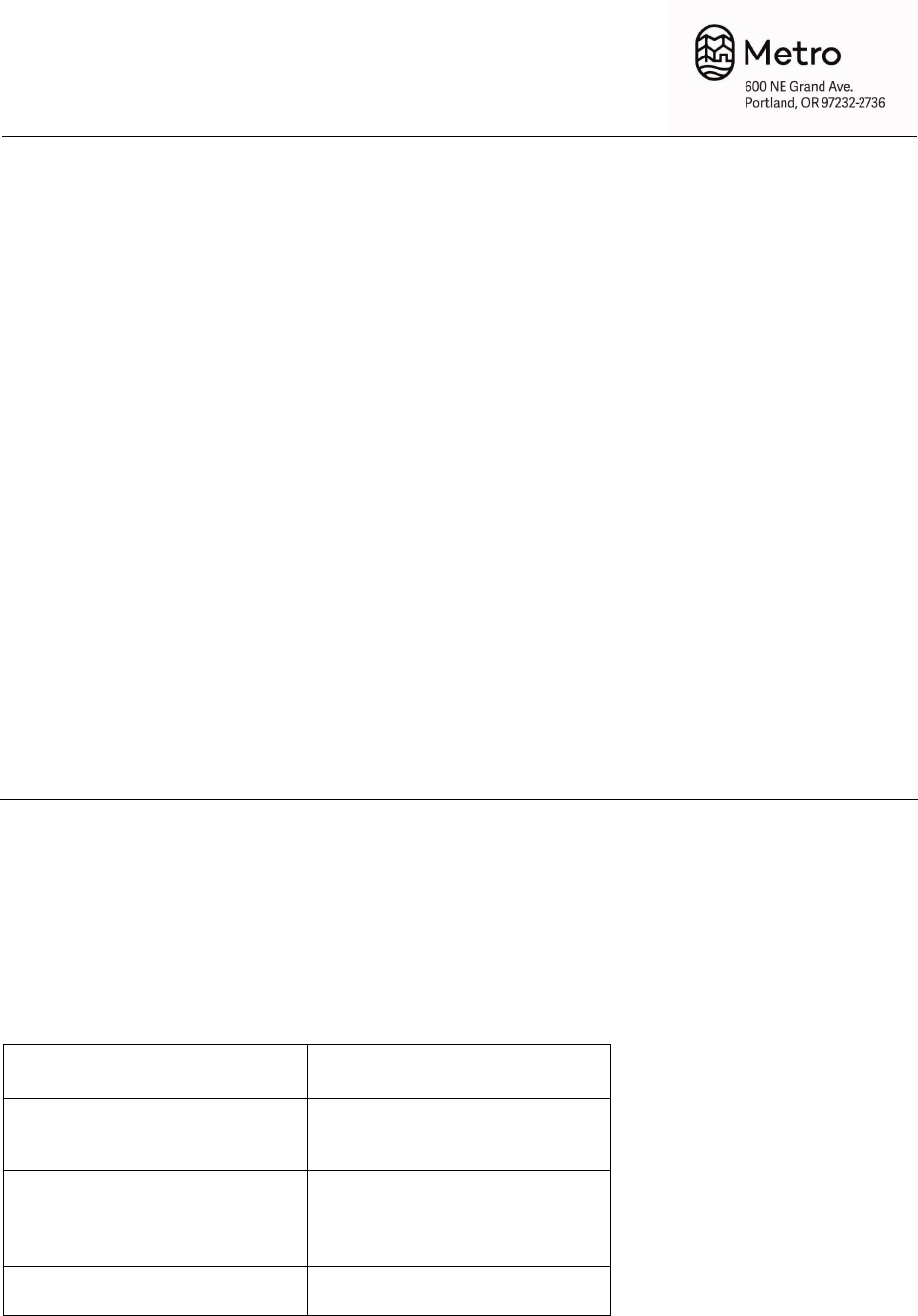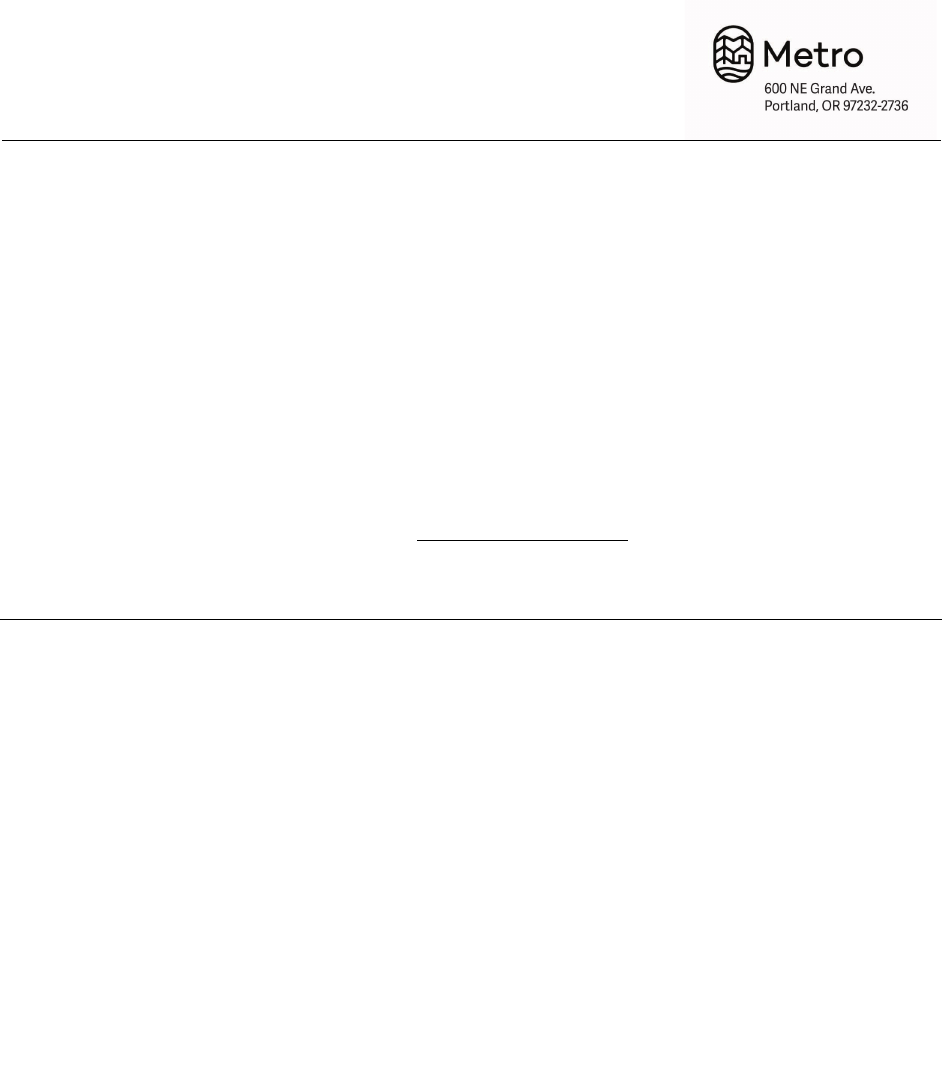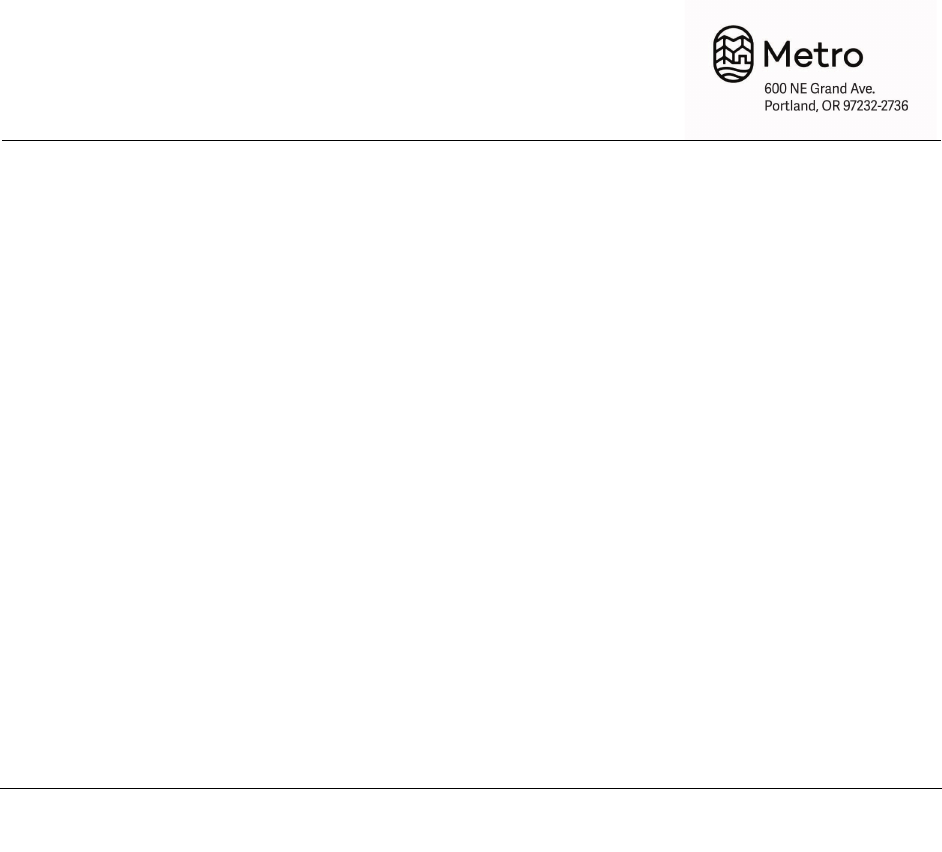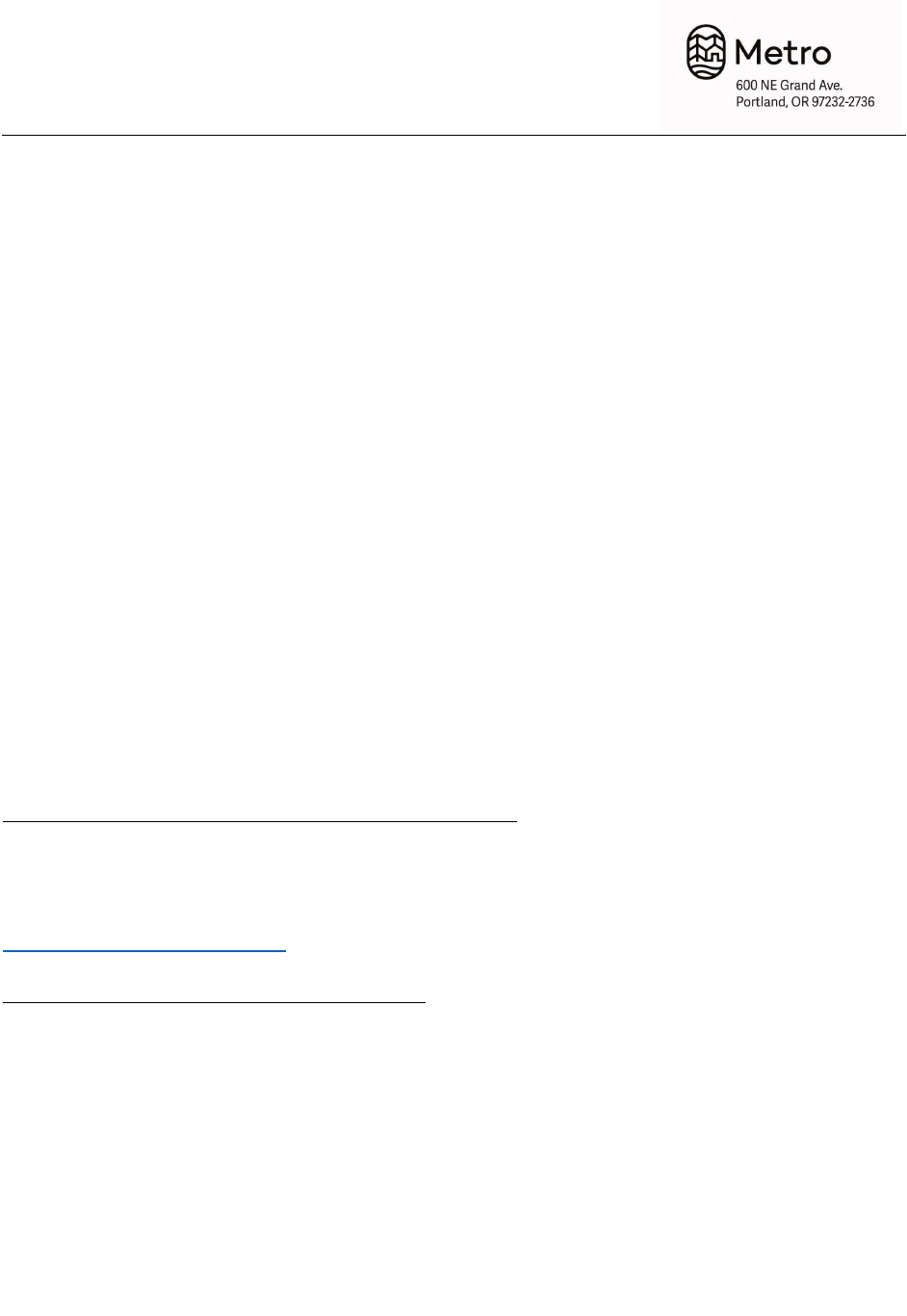
2021 Work Share voluntary furlough
Frequently asked questions
2021 Voluntary furlough and Oregon Work share FAQ updated Feb. 1, 2021 1
Published for voluntary schedule reductions from January 1 through June 30, 2021.
Updated Feb. 1, 2021, updated items are indicated.
Many Metro employees have taken furlough or a reduced schedule to help mitigate financial impacts to
Metro due to the COVID-19 pandemic and reduce work schedules to meet caregiver and other time off
needs. Metro participates in the Oregon Work Share program that helps offset wage loss from reduced
hours with unemployment benefits. Below is more information on furlough and Work Share.
NEW Some work areas at Metro have limited staff capacity and a schedule reduction may not be an
option due to critical work and maintaining operations.
Reduced work schedules are subject to supervisor approval. Approved schedules may be
changed due to business needs with two weeks notice of change.
Instructions and application forms are at oregonmetro.gov/workshare
In this document
- Reduced work schedule examples, schedule questions
- Benefits, vacation, sick leave and holidays
- About the Oregon Work Share Program and unemployment
- Reporting hours and requirements for furlough and reduced schedule hours and days off
WORK SCHEDULES DURING FURLOUGH AND REDUCED SCHEDULES
How many hours each week must I reduce my hours? Employees who are eligible for Work Share must
reduce their hours by at least 20% or no more than 40%. Employees who are not eligible for Work Share
can take furlough a portion or all of a work week to meet the furlough obligation.
Here are example schedules for reduced schedules of 20, 30 and 40%:
Reduction amount
Furlough hours each work
week
20% reduction
8 hours each work week
2 hours off for 4 days
4 hours off for 2 days
One, 8-hour day off
30% reduction
12 hours each work week
3 hours off for 4 days
4 hours off for 3 days
One 8 hour day off and 4 hours off
for one day.
40% reduction
16 hours each work week
4 hours off for 4 days
Two 8-hour days off

2021 Work Share voluntary furlough
Frequently asked questions
2021 Voluntary furlough and Oregon Work share FAQ updated Feb. 1, 2021 2
How will this impact me if I’m currently on a weekly schedule of 4 10-hour days or a flexible schedule
(five 9-hour days one week, or three 9-hour days and one 8-hour day the following week)?
Employees who work 10-hour days may need to reduce their schedule to 8-hour days. Employees
cannot work more than their reduced schedule each work week. Employees and their supervisors will
need to determine a new, temporary schedule to meet this requirement.
Can I change my schedule during this time after my furlough schedule is approved?
Yes, but please make sure to seek approval for schedule changes with as much notice as possible. Any
adjustments to Kronos must be made 5 pm the Monday following each work week in order to do the
weekly reporting to Work Share. Metro work weeks are Monday to Sunday.
What is my pay while on furlough or reduced schedule?
Employees can use the paycheck calculator at www.paycheckcity.com
for an estimate of what their new
net pay will be with furlough hours.
BENEFITS, VACATION, SICK LEAVE, HOLIDAYS AND TIME OFF
What happens to my benefits during this time?
Health insurance and vacation and sick leave accruals remain unchanged from employee’s regular status
during the term of this agreement. PERS contribution are reduced since those are based on the
employee’s actual earned wages. Employees will still receive a full month of creditable service for each
month they have work weeks with a schedule reduction.
UPDATED Can I use vacation time during weeks I am also on reduced schedule for the furlough?
Conflicting information on this topic was been provided to us from the Oregon Employment
Department. In December 2020 we were provided information that employees could use vacation leave
for non-illness related leave and continue to participate in Work Share. Later in January 2021 we
received an update and the current guidance only allows for vacation time to be used with Work Share if
the employee has no other accrued leave to cover for an illness or protected leave absence or if there
are no work opportunities available for the employee during that work week.
Can I use sick leave while on furlough and still qualify for Work Share? What about jury leave?
Yes. The Oregon Employment Department is allowing employees to continue their weekly Work Share
unemployment filing when using sick leave, jury leave or any other paid leave due to COVID-19. On work
weeks that this occurs, supervisors should use Kronos codes to apply sick, jury or personal leave to
applicable days, keep any days worked as such and keep the furlough time off entry intact.
Continued next page

2021 Work Share voluntary furlough
Frequently asked questions
2021 Voluntary furlough and Oregon Work share FAQ updated Feb. 1, 2021 3
Am I eligible for the Work Share Program if I am on COVID-19 protected leave that is part of the
Families First Act (i.e. the emergency family leave or the extended family medical leave)?
Note that the Family First Act (FFRCA) expired on Dec. 26, 2020. Metro has implemented an extension of
the emergency COVID-19 paid leave of 80 hours. Some usage of COVID-related leave may allow you to
participate in Work Share while in other situations they may not. Given the complexity of leave laws and
the Work Share program, if you have a question you should contact Human resources staff at
benefits.help@oregonmetro.gov
How will paid holidays be handled?
Employees can take paid holidays and participate in Work Share. For example, using the Dr. King holiday
and an employee who reduces their schedule by taking Fridays off: The holiday is taken on Monday, Jan.
18 and the employee has the day off on Friday, Jan. 22 for their furlough or reduced schedule, and
works that Tuesday, Wednesday and Thursday.
I am represented by AFSCME Local 3580 and earn premium holiday pay when I work on paid holidays.
Does that change my Work Share eligibility?
Yes it does impact your Work Share eligibility. AFSCME and Metro have agreed to allow employees who
participate in Work Share and work on paid holidays to defer their holiday pay at the premium holiday
pay rate (instead of straight pay). Hours worked that day are paid at regular pay to avoid impacting
Work Share.
ABOUT THE OREGON WORK SHARE PROGRAM AND UNEMPLOYMENT
What is the Oregon Work Share program?
The Oregon Work Share program is a short time compensation program that offers businesses and
organizations an alternative to layoffs. Employees are required to complete an initial claim form and
Human Resources will report the loss of hours to the Oregon Employment Department each week.
What are eligibility requirements for the Work Share Program?
Below are some requirements for Work Share participation. If any of these apply, check with staff in
Human resources to determine your eligibility.
• Employees must have worked full-time for at least 6 months or part-time for at least 12 months.
• Employees who are limited duration, temporary or seasonal status employee and have not worked
on a continuous basis or meet the minimum qualifying hours may not qualify for the program.
• Employees who have qualifying income separate from employment with Metro (second job,
additional income, retirement benefits, etc.) may not qualify for unemployment benefits and must
report weekly earnings to HR so they can be included in the weekly report to determine work share
benefits.
Continued next page

2021 Work Share voluntary furlough
Frequently asked questions
2021 Voluntary furlough and Oregon Work share FAQ updated Feb. 1, 2021 4
How do I sign up for Work Share?
Employees need to complete an Initial Claim Form for the Oregon Employment Department and submit
to Human Resources using the secure file sharing location. Forms and instructions are at
oregonmetro.gov/workshare. Employees who have previously participated in Work Share do not need
to full out a new form.
I do not want to participate in the Work Share program. Is this optional?
As of January 1, 2021 this reduction of hours for most employees, including all AFSCME represented
positions, is voluntary. Employees who are Work Share eligible and wish to have unemployment
compensation must do so through the Work Share program. An employee may choose to not receive
unemployment compensation and still reduce their schedule.
Will I qualify for Work Share unemployment compensation?
The State of Oregon determines eligibility and benefit amounts. Employees must fill out an Initial Claim
Form and Human Resources staff will file those forms on behalf of employees to begin the application
process. In the rare instance an employee is not eligible, Human Resources staff will work with the
employee to resolve the issue or discuss schedule options to optimize unemployment filing benefits.
Will unemployment benefits cover all of my loss wages?
No, but it will cover some. An unemployment benefits estimator is at
https://secure.emp.state.or.us/ocs/estimator/index.cfm
Under the Work Share program employees are eligible for 20 to 40 percent of what they would have
received if they had been laid off or a percentage of the current Oregon unemployment maximum
weekly benefit of $648. For most employees who furlough by 20% (or 8 hours) in a work week, their
unemployment benefit is about $130 per week and $105 after taxes. If you make less than about
40,000, your weekly benefit will be adjusted accordingly.
I live in Washington. Do I apply in Oregon or Washington for unemployment benefits?
Metro employees apply in Oregon regardless of residency in Washington. Note that Human Resources
will submit applications for employees who participate in the Work Share program.
What if I was in a part-time position and moved to full-time position (or vice-versa) over the last
year? Am I eligible for this program?
You have to have worked in a full-time status continuously for the last six months or in a part-time status
continuously for the last 12 months to qualify.
What if I work part time (less than 1.0 FTE)? Can I participate in Work Share?
Yes, as long as you take a schedule and pay reduction of at least 20%, you are eligible to participate in
the Work Share program.
Will the Work Share impact my future eligibility for unemployment benefits?
Yes. Each weekly payment from Work Share counts against your maximum unemployment entitlement
for the benefit year. A benefit year begins the first week you file for unemployment and continues for 12
months for that date before renewing.

2021 Work Share voluntary furlough
Frequently asked questions
2021 Voluntary furlough and Oregon Work share FAQ updated Feb. 1, 2021 5
Will I be eligible to receive the $300 federal Pandemic Unemployment Compensation (PUC) passed by
Congress in late December 2020?
At this time we believe so but the law is very new and we do not have confirmation of this from the
Oregon Unemployment Division. We will update this FAQ as information becomes available, also look
for updates in the weekly emails from our HR team.
Are the payments taxed?
Yes, payments under the Work Share program are taxable income and employees can elect to have
taxes withheld from unemployment compensation payments. At the end of January 2021, you will
receive a Form 1099-G mailed from the Oregon Employment Department, which is a Statement for
Recipients of Unemployment Compensation, to use in filing your 2020 tax returns.
Is there a one-week waiting period before receiving unemployment benefits?
Oregon Governor Kate Brown has waived the waiting week requirement. However, the Oregon
Unemployment department has not yet configured their system to change the new policy and process
on the waiting week payment. The first week of filing, called the waiting week will be paid, just not in
sequence with other payments.
How will I receive unemployment payments?
The payments will come from the Oregon Employment Department and are separate from your Metro
paycheck. The first payment will be mailed to the address provided on the Initial Claim Form. Additional
weeks will be mailed, provided on a debit card that is mailed to you or by direct deposit if a form is
completed and submitted. Checks may arrive out of order.
Unemployment payments will be delayed by several weeks: The Oregon Employment Department is
currently reporting a several week backlog for processing unemployment payments. We cannot
guarantee a certain time that state payments will begin, and there may be some delay in payments.
Benefits will be paid retroactively to the date you started on Work Share. Employees who may have
difficulty waiting for these claims to be paid should contact Human Resources at
benefits.help@oregonmetro.gov for support.
Funds may be deposited on a US Bank Reliacard: Unemployment benefits may be provided on a US Bank
Reliacard (even if you request direct deposit). If you receive a US Bank Reliacard after filing for
unemployment, activate the card to access payments. Once you have activated the card, download the
Relicard app or visit the provided website to set up your account settings including notifications for text
or email messages letting you know when deposits are made to the card. Users are provided 2 free ATM
uses each month to withdraw funds and can transfer funds using the app or through the Reliacard
website.
I have a second job. Will this affect my payment amount through Work Share?
Maybe. Employees must report income from other jobs and retirement from the past two years on the
Initial Claim Form. It is possible to earn too much income from other sources to receive unemployment
benefit payments, even if you are otherwise eligible for unemployment. That income will reduce your
Work Share unemployment benefits dollar for dollar.

2021 Work Share voluntary furlough
Frequently asked questions
2021 Voluntary furlough and Oregon Work share FAQ updated Feb. 1, 2021 6
For example, if you qualify for $130 per week of Work Share unemployment and you work a part-time
position at Fred Meyer and earn $100 per week, you will only be eligible for $30 of unemployment
compensation. Additional earnings can be reported each week by sending an email to
benefits.help@oregonmetro.gov
. Please put Earnings claim in the subject line of each email. Emails
must be provided each week.
What if I am currently receiving retirement pay?
If an employee is receiving retirement from an employer they worked for within the last 18 months, this
must be entered on the Initial Claim Form and may affect their eligibility to participate in the Work
Share program. Retirement pay will be deducted dollar-for-dollar against weekly benefit amount for
regular unemployment insurance. If you have a retirement that began before 18 months ago may also
reduce your work share benefits.
What if I am currently receiving money through an IRA distribution?
Money received through an IRA distribution could affect your eligibility to participate in the Work Share
program. The money you receive will be deducted dollar-for-dollar against weekly benefit amounts for
unemployment compensation. This income needs to be reported weekly to
benefits.help@oregonmetro.gov.
What if I am receiving Social Security?
Receiving Social Security will not impact your eligibility to receive unemployment compensation under
the Work Share program.
Can the state withhold payments if I am behind on state income tax payments or other payments such
as child support or alimony?
Yes, garnishments will be deducted from Work Share and CARES Act payments in the same manner and
to the same extent as these obligations are deducted from regular unemployment compensation.
Some debts, such as federally guaranteed student loans, are exempt from collection for a period of
time. Both the employee and Metro should receive a notice from the debt processor if your debt is
exempt from collection during this period.
I participate in the Public Service Loan Forgiveness Program (PSLF). Will participating in the Work
Share program affect my eligibility to participate in PSLF? PSLF is a program through the U.S.
Department of Education. To qualify for the program an employee must be considered full-time status
to be eligible – at Metro this is anyone who works more than 0.8 FTE. A 1.0 FTE employee who reduces
by 20%, or 8 hours, is still considered a full time employee.
Continued next page

2021 Work Share voluntary furlough
Frequently asked questions
2021 Voluntary furlough and Oregon Work share FAQ updated Feb. 1, 2021 7
IMPORTANT NOTE ON REPORTING HOURS
Employees cannot work in excess of scheduled hours and be eligible for Work Share
No work related, requests, emails or questions on a day or time scheduled off for Work Share
It is important that employees do not perform any work during the time their schedule has been
reduced. This includes answering emails or phone calls no matter how little time is spent. All work must
be done on a day you are scheduled to work and within your weekly hourly limit. If it is discovered that
work has been done on claimed days off, or working more than their reduced weekly hours, employees
may be ineligible for Work Share unemployment payments, and/or Metro may be disqualified from
participating in Work Share program. The failure to accurately report time worked, such as working
more than 32 hours and claiming only 32 hours or less, may constitute fraud and could result in criminal
penalties and overpayments from the Oregon Employment Office that you may be personally
responsible for returning the funds received.
Exempt Employees are required to provide weekly updates
If you work in excess of your scheduled hours, you must report those excess hours worked to your
supervisor no later than 5 p.m. Monday for the previous week. Metro’s eligibility for the Work Share
program is based on you only working your reduced schedule of 20% and no more. Metro must certify
that you worked a qualifying schedule to the Oregon Employment Department. If you are unable to
complete your workload on your reduced schedule, or you have worked more than your reduced
schedule, please alert your manager immediately.
Accurate time reporting is required Metro relies on employees to accurately report time worked.
Further, by completing your Kronos timesheet, you will be attesting that you did not work more hours
than your reduced work schedule. The failure to accurately report hours worked (e.g., working more
than 32 hours in a week as a .80 FTE, but claiming only 32 hours or less) may constitute fraud which
could result in criminal penalties. It may also lead to overpayments from the Oregon Employment Office
and you may be personally responsible to return the funds.
